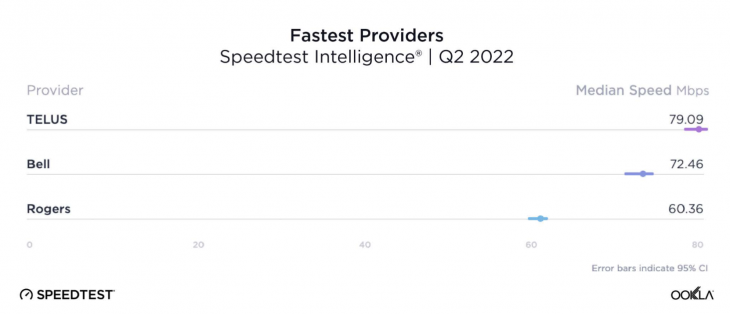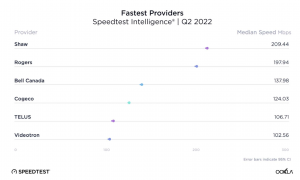
SEATTLE – Telus was Canada’s fastest national mobile operator and Shaw was the fastest fixed broadband service provider amongst the country’s top providers in the second quarter of 2022, according to Seattle-based broadband and mobile network testing company Ookla, which released its Q2 2022 results today.
Mobile
Ookla reported Telus had a median download speed of 79.09 Mbps. Bell, meanwhile, had a median speed of 72.46 Mbps and Rogers had a median speed of 60.36 Mbps. (Please see chart above.)
Rogers, however, had the fastest median upload speed for Q2 2022 at 9.21 Mbps compared to Telus (7.98 Mbps) and Bell (7.42 Mbps). Rogers also had the lowest median latency at 25 ms compared to Bell and Telus (both 26 ms).
Ookla also looked at consistency but found there was no statistical winner amongst Rogers (80.9%), Telus (80.6%) and Bell (79.8%). There was also no statistical winner in terms of 5G performance – Bell had a median speed of 139.75 Mbps, Telus had a median speed of 137.17 Mbps and Rogers had a median speed of 93.06 Mbps.
Broken down by region, Newfoundland and Labrador had the fastest median mobile download speed in Canada for Q2 2022 at 72.81 Mbps. This is followed by Alberta (70.58 Mbps), British Columbia (70.42 Mbps), Manitoba (67.64 Mbps), Ontario (64.44 Mbps), Nova Scotia (62.51 Mbps), Quebec (61.9 Mbps), New Brunswick (58.56 Mbps), Saskatchewan (50.65 Mbps) and Prince Edward Island (43.6 Mbps). Northwest Territories had the slowest median mobile download speed for Q2 2022 at 15.28 Mbps.
Ookla also reported St. Johns had “the fastest median mobile download speed among Canada’s most populous cities during Q2 2022 at 126.61 Mbps.” Other cities considered include Halifax (114.04 Mbps), Regina (104.09 Mbps), Toronto (90.21 Mbps), Winnipeg (88.41 Mbps), Calgary (88.01 Mbps), Quebec City (86.03 Mbps), Edmonton (85.55 Mbps), London (83.32 Mbps), Saskatoon (82.51 Mbps), Vancouver (82.19 Mbps), Hamilton (79.42 Mbps), Montreal (70.72 Mbps) and Ottawa (53.84 Mbps).
For more on mobile, please click here.
Fixed Broadband
Ookla’s report shows Shaw was the fastest of Canada’s top fixed broadband providers for Q2 2022 with a median download speed of 209.44 Mbps.
Rogers was the country’s next fastest provider with a median speed of 197.94 Mbps. This was followed by Bell (137.98 Mbps), Cogeco (124.03 Mbps), Telus (106.71 Mbps) and Videotron (102.56 Mbps). (Please see chart below.)

Bell had the fastest median upload speed among the fixed broadband providers in Q2 2022 at 106.81 Mbps, followed by Telus (93.3 Mbps), Shaw (57.96 Mbps), Videotron (32.67 Mbps), Cogeco (23.58 Mbps) and Rogers (20.34 Mbps).
Bell also had the lowest median latency of the fixed broadband providers for Q2 2022 at 5 ms. Telus (6 ms) was next, followed by Shaw and Rogers (both at 12 ms), and Cogeco and Videotron (both at 14 ms).
Ookla’s Q2 2022 report indicates there was no statistical winner for the consistency category for fixed broadband providers.
Rogers had a consistency score of 88.6%, while Shaw’s score was 88%, Cogeco’s was 87%, Videotron’s was 85.5%, Telus’s was 83.3% and Bell’s was 82.9%.
Broken down by region, the report shows Newfoundland and Labrador had the fastest median download speed for Q2 2022 at 143.9 Mbps and Yukon had the slowest at 45.97 Mbps.
British Columbia (141.9 Mbps), New Brunswick (137.47 Mbps), Nova Scotia (125.59 Mbps), Alberta (116.92 Mbps), Ontario (106.74 Mbps), Prince Edward Island (94.68 Mbps), Quebec (90.43 Mbps), Manitoba (86.89 Mbps), Saskatchewan (78.06 Mbps) and Northwest Territories (67.39 Mbps), fell in between.
Fredericton meanwhile had the fastest median download speed of the country’s most populous cities for fixed broadband in Q2 2022 at 192.16 Mbps, followed by St. Johns (185.77 Mbps), Edmonton (161.12 Mbps), Calgary (148.47 Mbps), Halifax (142.54 Mbps), Charlottetown (139.14 Mbps), Toronto (137.53 Mbps), London (136.64 Mbps), Saskatoon (131.08 Mbps), Vancouver (121.43 Mbps), Ottawa (117.91 Mbps), Hamilton (117.4 Mbps), Winnipeg (114.55 Mbps), Quebec City (107.24 Mbps), Regina (92.71 Mbps) and Montreal (76.95 Mbps).
For more on fixed broadband, please click here.
Charts borrowed from Ookla’s Q2 2022 report.


